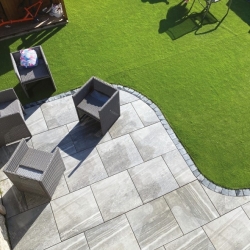0333 321 5091
01909 768 760
Mon - Fri 7:00 AM - 5:00 PM
Sat 8:00 AM - 2:00 PM

We Deliver
Nationwide
0333 321 5091
01909 768 760
Mon - Fri 7:00 AM - 5:00 PM
Sat 8:00 AM - 2:00 PM

We Deliver
Nationwide

Over the last few years, porcelain paving has really made a name for itself as a fantastic alternative to traditional natural stone paving but there still seems to be a lack of understanding surrounding using porcelain as a paving slab option. So at Paving Stones Direct, we got our heads together and decided to put a list of facts everyone should know before buying porcelain paving.
Due to garden paving normally being associated with natural stone, the association that porcelain paving is cut from natural stone can often be carried over which is incorrect. Porcelain paving is formed by baking sand, clay and other materials at a very high temperature, which creates a durable, non-porous man-made material. This makes porcelain ideal for paving.
You would be forgiven for thinking that porcelain is one of the last materials you can think of that would be a good choice for paving, especially if you have ever had interactions with porcelain plates, vases, etc. During the creation process, porcelain paving is met with incredibly high temperatures which makes the slabs extremely strong, more durable and a lot denser than natural stone. This strength makes porcelain paving slabs perfect for commercial areas and driveways with heavy traffic.
This is, without a doubt, one of the most beneficial features of this paving slab option. Due to this porcelain being non-porous, liquids tend to sit on the surface of the paving, rather than absorbing it like traditional natural stone. This leads to porcelain paving having an exceptionally high stain resistance, even against liquids such as oil. In most cases, if you wipe up any liquids within a reasonable time frame, your patio paving will be unaffected but if you leave it for much longer (why would you?), you may then be required to put a bit of ‘elbow grease’ in to clean the stain up.
In the UK, we are blessed with all manner of different weather types such as scorching sun, snow covered winters and the typical rainy seasons but these shifting weather patterns can cause issues for your paving, especially the colder, frostier variants. Natural stone paving can more often than not be affected by conditions such as these and require aftercare products to ensure they last as long as possible. Fortunately, paving made from porcelain is extremely resistant to the British weather conditions making them slip and frost resistant. This resistance also means it is very difficult for mould and mildew to form.
This ties in perfectly with porcelain paving’s resistance against the elements. Due to the strength and very nature of this paving, it has a very low maintenance point. This means that in most cases, the only effort needed to keep your porcelain patio looking fresher for longer is to sweep with a soft bristled broom (To prevent scratching), a good hose down and to dry it with a soft rag to prevent watermarks from forming. If you were to do this every month to 6 weeks, your paving will look as new as it did the day it was installed.
You may not associate outdoor porcelain tiles as a good option for indoor areas such as a porch or conservatory but the fact that the material is porcelain makes it a great choice. This also means you can coordinate your outdoor space with your indoor space to create a wonderful ‘flow effect’ moving from in to out or vice-a-versa. You could also opt for contrasting colours to really give your new patio and indoor space the wow factor.
When we say the right kind of paving finish, we don't mean the colour but rather the finish on the paving. While most finishes are great regardless of location, some are simply better suited for specific areas such as polished and matt finish porcelain paving which are better for indoor type areas while traditional textured porcelain paving tends to work best for your outdoor areas or any place where additional grip may be needed.
It cannot be denied that natural stone paving options such as sandstone, limestone, slate and granite have a wonderful array of natural colours and patterns which adds character to any garden patio but porcelain paving sports a larger choice offering. This is simply due to being man made so regardless of the colours, style and patterns needed to transform your garden patio, you will be able to find a porcelain paving equivalent.
While you can look at the beautiful photography showcasing porcelain slab options and decide that is the right choice for you, sometimes that is not always the case so it’s worth ‘testing’ the look of some paving to make sure it truly works with the design of the garden. That's why it is always worth investing in a few samples before you commit to a full purchase. The great thing about this is, if you love the look of a sample ordered and purchase a full pack, at Paving Stones Direct, we will refund you the cost of your chosen sample so make sure to contact us when making your purchase.
While the process of installing porcelain paving is different to natural stone due to porcelain paving being non-porous, it is just as easy to install. Porcelain paving requires a bit more cement to be used in comparison which helps to build a strong bond between the earth and the paving, ensuring there is no shifting. They will also need to be installed at a sloped gradient so drainage will work as intended. Apart from these differences, the rest of the process is very similar to installing natural stone paving.
If you do any shopping around and start to compare the cost of porcelain paving to natural paving such as sandstone or limestone, you may find that porcelain may be more expensive at times. This is due to the manufacturing process involved in creating porcelain slabs. While you may be tempted for the cheaper option of natural paving slabs, it is worth considering the long term cost rather than the short term. In most cases, after you consider aftercare products needed to maintain natural paving, porcelain paving’s very low maintenance point and weather resistance actually works out cheaper.
This concluded our 10 things to know before buying porcelain paving (and one bonus point). Hopefully this will help to shed some light on this incredibly beautiful and versatile paving and help you decide if it is right for you. Need any advice regarding porcelain paving or anything paving related?, please do not hesitate to contact us either by phone or drop us an email on sales@pavingstones.co.uk.
Note - Information provided to be used as a guide only. Please contact a trained and informed professional for any guidance regarding porcelain paving and the installation of porcelain paving slabs.